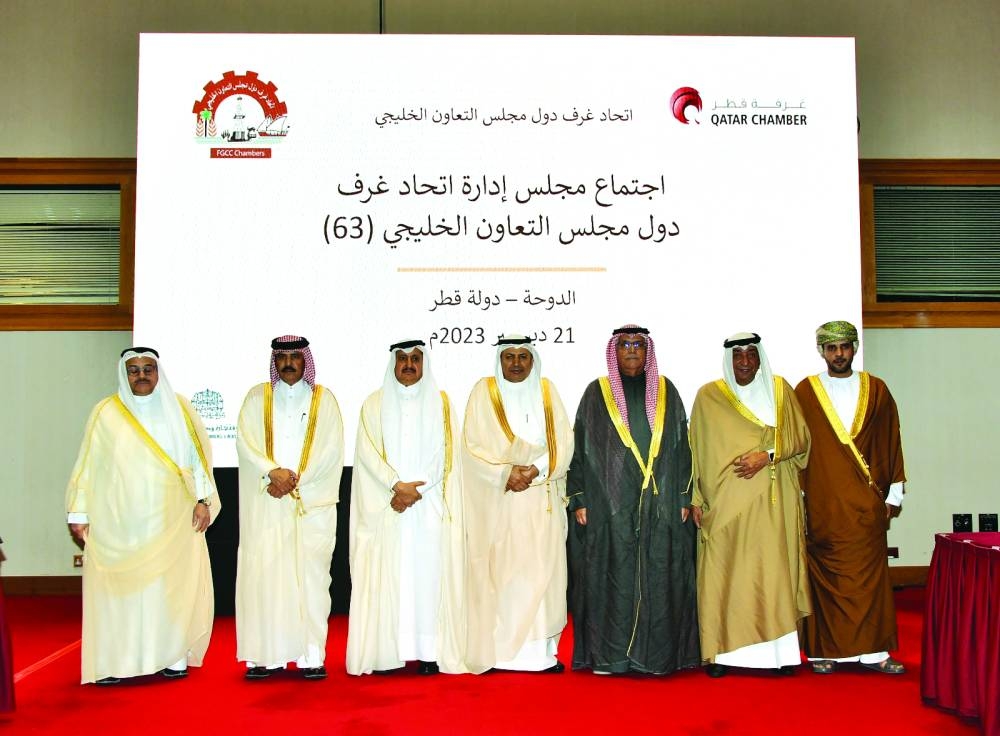Qatar Chamber yesterday highlighted the pivotal role of private sector in the Gulf Co-operation Council (GCC) countries in ensuring economic integration in the region, where intra-trade has exceeded $100bn.
Highlighting the importance of boosting co-operation between Gulf businessmen and activating mutual investments to boost Gulf intra-trade, which has exceeded $100bn; Qatar Chamber chairman Sheikh Khalifa bin Jassim al-Thani said "the ongoing political and economic shifts affecting the global economy, coupled with the current geopolitical challenges and their impacts on GCC countries, have compelled us to redouble our efforts in enhancing economic, trade, and investment cooperation among our states."
Addressing the 63rd board of directors meeting of the Federation of GCC Chambers (FGCCC), he said the GCC possesses significant potential and capabilities, in addition to a strong desire and will to achieve economic unity, both at the leadership and public levels.
The FGCCC delegation participating in the meeting included Rashid bin Hamad al-Athba, second vice-chairman, and board members Sheikh Hamad bin Ahmed al-Thani, Ibtihaj al-Ahmadany, Ali bin Abdullatif al-Misnad and Mohamed bin Ahmed al-Obaidli, as well as Ali bu Sherbak al-Mansouri, deputy general manager.
"The GCC owns all the potential to become a strong economic alliance capable of imposing itself on the global economic map, indicating that this is attributed to the natural resources it owns, and its distinctive geographical location, in addition to the robust relations with a multitude of global economic entities and alliances," according to Sheikh Khalifa.
He underscored the "pivotal" role of the Gulf private sector in fostering economic integration among the member states, the significance of collaborative efforts among member chambers to support the Gulf private sector, strengthen alliances, and foster partnerships among Gulf firms.
Appreciative of the efforts made by the member countries to achieve Gulf economic integration, he said "we hope to witness increased co-operation between the public and private sectors within our nations, aiming to overcome any challenges that may hinder such integration."
"Additionally, we aspire to enhance investment incentives, empowering the Gulf private sector to play a crucial role in the comprehensive economic development of the Gulf region,” he added.
Hassan bin Muajab al-Huwizi, president of the FGCCC and president of Saudi Chambers of Commerce, highlighted the numerous developments in economic affairs within the GCC and the positive growth achieved by the GCC countries, in which the private sector played a key role.
"The GCC countries are among the most important global economies, attracting both local and foreign investments and experiencing remarkable growth in promising sectors such as technology and tourism,' he said.
The FGCCC should capitalise on opportunities arising from the council’s visions, strengthen partnerships with concerned bodies in the GCC countries at the highest levels, and foster co-ordination with the GCC general secretariat, aiming to empower the private sector and increase its contribution in the GCC GDP (gross domestic product), according to him.
FGCCC has successfully addressed 25 out of 58 topics discussed in the consultative meetings with the Ministers of Trade and Industry in the GCC countries, he highlighted.
The Doha meeting approved the transition of the FGCCC's presidency to Oman Chamber of Commerce and Industry for the term 2024 to 2026.
Business
Qatar Chamber suggests strengthening private sector for Gulf economic integration; intra-trade exceeds $100bn

FGCCC officials have highlighted the role of private sector in Gulf economic integration.
